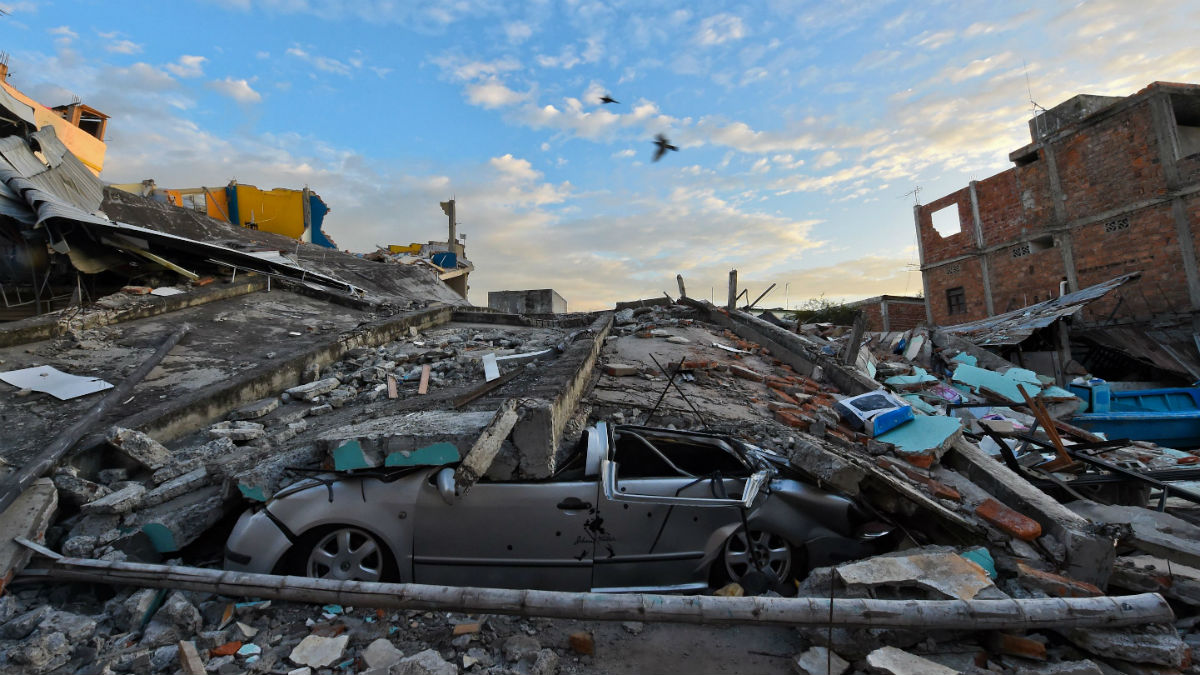Ecuador earthquake death toll rises to 272
'Everybody in my neighbourhood was screaming, saying it was going to be the end of the world'

A free daily email with the biggest news stories of the day – and the best features from TheWeek.com
You are now subscribed
Your newsletter sign-up was successful
At least 272 people are now known to have died in the huge earthquake that hit Ecuador on Saturday.
The quake, which measured 7.8 on the Richter scale, was the biggest to hit the country in more than four decades and could be felt as far away as Colombia.
President Rafael Correa yesterday declared a state of emergency after cutting short a visit to Italy to deal with the disaster.
The Week
Escape your echo chamber. Get the facts behind the news, plus analysis from multiple perspectives.

Sign up for The Week's Free Newsletters
From our morning news briefing to a weekly Good News Newsletter, get the best of The Week delivered directly to your inbox.
From our morning news briefing to a weekly Good News Newsletter, get the best of The Week delivered directly to your inbox.
Around 10,000 troops and 3,500 police have been deployed to help the rescue operations and the death toll is expected to rise as they dig through the rubble.
With the epicentre just off the country's Pacific coast, the government had urged people to leave coastal areas because of concerns about a tidal wave in the immediate aftermath. Alarmed residents also streamed onto the streets of the capital, Quito, hundreds of miles away, and there were reports of similar panic in towns across Ecuador.
Parts of the capital were left without power or telephone services, but state officials said the country's oil output, the main driver of the economy, has been unaffected.
Ecuador's Geophysics Institute has reported at least 36 aftershocks, one as strong as magnitude six, and warned these were likely to continue for some days.
A free daily email with the biggest news stories of the day – and the best features from TheWeek.com
One survivor, whose house in Guayaquil was violently shaken by the tremors, told CNN: "It was the worst experience of my life. Everybody in my neighbourhood was screaming, saying it was going to be the end of the world."
Venezuela and Mexico have pledged specialist aid, while Ecuador's government has released $600m (£423m) in emergency funding to rebuild devastated cities.
The US Geological Survey said the earthquake was roughly six times as powerful as the ones that struck Japan last week.
The magnitude of 7.8 matches that of the 1906 earthquake that reduced the city of San Francisco to rubble.
-
 Political cartoons for February 16
Political cartoons for February 16Cartoons Monday’s political cartoons include President's Day, a valentine from the Epstein files, and more
-
 Regent Hong Kong: a tranquil haven with a prime waterfront spot
Regent Hong Kong: a tranquil haven with a prime waterfront spotThe Week Recommends The trendy hotel recently underwent an extensive two-year revamp
-
 The problem with diagnosing profound autism
The problem with diagnosing profound autismThe Explainer Experts are reconsidering the idea of autism as a spectrum, which could impact diagnoses and policy making for the condition
-
 Epstein files topple law CEO, roil UK government
Epstein files topple law CEO, roil UK governmentSpeed Read Peter Mandelson, Britain’s former ambassador to the US, is caught up in the scandal
-
 Iran and US prepare to meet after skirmishes
Iran and US prepare to meet after skirmishesSpeed Read The incident comes amid heightened tensions in the Middle East
-
 Israel retrieves final hostage’s body from Gaza
Israel retrieves final hostage’s body from GazaSpeed Read The 24-year-old police officer was killed during the initial Hamas attack
-
 China’s Xi targets top general in growing purge
China’s Xi targets top general in growing purgeSpeed Read Zhang Youxia is being investigated over ‘grave violations’ of the law
-
 Panama and Canada are negotiating over a crucial copper mine
Panama and Canada are negotiating over a crucial copper mineIn the Spotlight Panama is set to make a final decision on the mine this summer
-
 Why Greenland’s natural resources are nearly impossible to mine
Why Greenland’s natural resources are nearly impossible to mineThe Explainer The country’s natural landscape makes the task extremely difficult
-
 Iran cuts internet as protests escalate
Iran cuts internet as protests escalateSpeed Reada Government buildings across the country have been set on fire
-
 US nabs ‘shadow’ tanker claimed by Russia
US nabs ‘shadow’ tanker claimed by RussiaSpeed Read The ship was one of two vessels seized by the US military